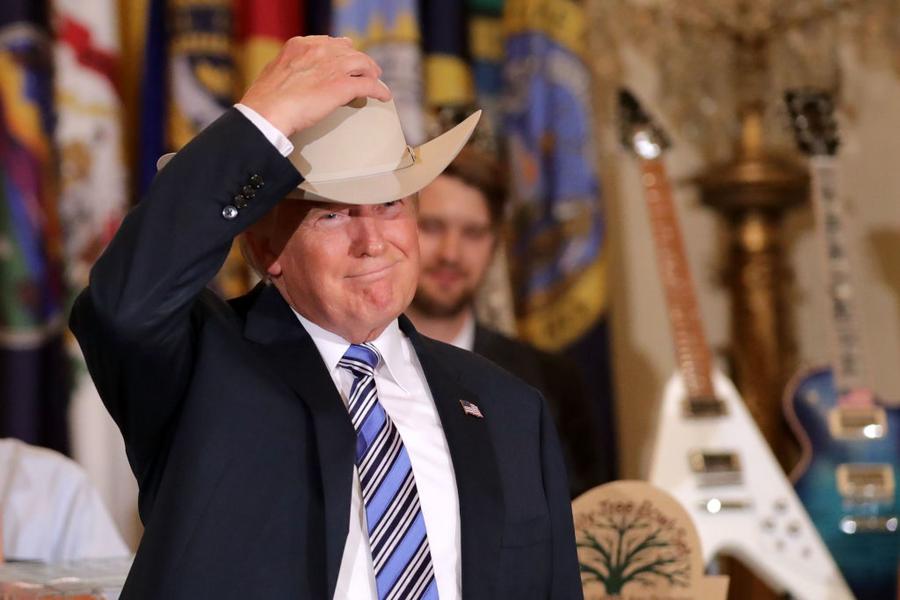We've all made decisions that have come back to haunt us. Maybe you rented an apartment that turned into a nightmare, or skipped a trip with friends you still wish you'd taken. But most of our regrets don't come close to passing on the chance to buy the Dallas Cowboys for what today seems like pocket change.
Back in the early 1980s, Donald Trump was presented with exactly that opportunity. Cowboys founder Clint Murchison Jr. was looking to sell the franchise, and Trump was one of the prospective buyers. The asking price? $50 million. Trump could have easily afforded it at the time. Yet he declined — and gave a memorable quote in the process:
"I feel sorry for the poor guy who is going to buy the Dallas Cowboys. It's a no-win situation for him, because if he wins, well, so what, they've won through the years, and if he loses, which seems likely because they're having troubles, he'll be known to the world as a loser."

Chip Somodevilla/Getty Images
The Cowboys Struggled In The 1980s
At the time, Trump's logic didn't seem completely unreasonable. The Cowboys were still one of the NFL's premier teams, having made nine straight playoff appearances and reaching three Super Bowls during that stretch. But cracks were beginning to show. After years of success under legendary coach Tom Landry, the team was starting to falter.
Murchison eventually sold the team in 1984 to oil millionaire H.R. "Bum" Bright for $85 million. Bright initially saw the Cowboys make the playoffs in his first year as owner, but the team quickly descended into mediocrity. They posted three straight losing seasons, including a disastrous 3-13 campaign in 1988.
Bright's enthusiasm for the franchise dwindled alongside the team's performance. To make matters worse, he reportedly lost tens of millions during the savings and loan crisis of the 1980s. His financial position forced him to sell, and in February 1989, Arkansas oilman Jerry Jones stepped in and bought the Cowboys.
Jerry Jones Turned The Cowboys Into A Gold Mine
Before he ever set foot in the Cowboys' owner's box, Jerry Jones had already struck it rich in the oil and gas industry. After some early business missteps, including an ill-fated investment in a chain of Shakey's Pizza parlors, Jones founded Jones Oil and Land Lease in the late 1960s. The company drilled for oil and natural gas, and Jones hit it big during the energy booms of the 1970s and 1980s. At one point, he reportedly cleared millions from a single drilling deal, giving him the financial firepower to make bold plays. By the late 1980s, he had amassed enough personal wealth to afford one of the riskiest and most expensive bets in sports history.
When H.R. "Bum" Bright was forced to sell the Cowboys, Jones swooped in. The franchise itself was valued at around $60 million, but once you added Texas Stadium and related debts, his total outlay reached $140 million. At the time, it was the highest price ever paid for a sports team, and many thought Jones had grossly overpaid.
Jones's tenure didn't start smoothly — his decision to fire Tom Landry was met with outrage from fans and the media. But the move paved the way for one of the greatest turnarounds in sports history. Partnering with coach Jimmy Johnson, Jones rebuilt the roster through shrewd drafting and bold trades, including the legendary Herschel Walker deal.
The payoff was immense. By the mid-1990s, the Cowboys had won three Super Bowls in four years, cementing themselves as "America's Team." Off the field, Jones transformed the franchise into a business juggernaut. He pioneered new revenue streams through sponsorships, branding, and stadium innovations, setting the template for modern NFL ownership.
The Value Of A Missed Opportunity
Today, the Cowboys are valued at $13 billion, making them the most valuable team in professional sports. That means Jones has enjoyed an astonishing return:
- From $140 million → $13 billion: about a 9,186% gain.
- From $60 million → $13 billion: about a 21,567% gain.
And if Donald Trump had written that $50 million check in 1983? His stake would now be worth $13 billion, representing a 25,900% return.
Trump's "What If" Moment
Instead of becoming the most successful owner in sports, Trump turned his attention to other ventures. He bought the New Jersey Generals of the short-lived USFL, a move that ended poorly when the league collapsed after challenging the NFL. In hindsight, passing on the Cowboys may be one of the most financially costly decisions of his life.
It's easy to look back and laugh at the misstep. At the time, the Cowboys looked like a franchise headed in the wrong direction. But what Trump dismissed as "a no-win situation" turned out to be one of the most lucrative opportunities in sports history.
Today, the Dallas Cowboys are more than a football team — they are a global brand worth $13 billion, a towering monument to what could have been had Trump written a $50 million check in 1983.
/2017/07/GettyImages-491868080.jpg)
/2016/01/GettyImages-494750710.jpg)
/2009/09/donald.jpg)
/2020/11/GettyImages-1084954168.jpg)
/2021/02/palm.jpg)
/2015/07/trump2.jpg)
/2020/01/lopez3.jpg)
/2009/09/Jennifer-Aniston.jpg)
:strip_exif()/2009/09/P-Diddy.jpg)
/2009/11/George-Clooney.jpg)
/2009/09/Cristiano-Ronaldo.jpg)
/2018/03/GettyImages-821622848.jpg)
/2009/09/Brad-Pitt.jpg)
:strip_exif()/2015/09/GettyImages-476575299.jpg)
/2020/02/Angelina-Jolie.png)
/2019/11/GettyImages-1094653148.jpg)
/2019/04/rr.jpg)
/2019/10/denzel-washington-1.jpg)
/2020/04/Megan-Fox.jpg)
/2017/02/GettyImages-528215436.jpg)
/2020/06/taylor.png)